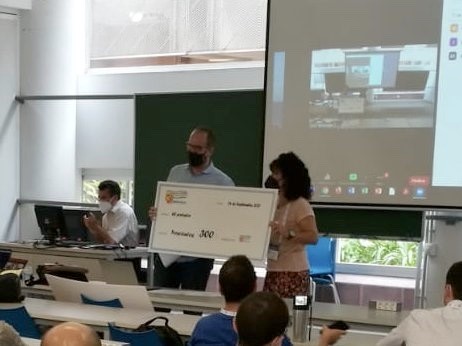Raul Garcia Hemonnet
One of the main goals of Artificial Intelligence (AI) should be to make life easier for human beings. Contemporary society has more and more digitized administrative processes, it is what is known as 'Electronic Administration'. The award-winning article, 'Modelling Administrative Discretion Using Goal-Directed Answer Set Programming', proposes an AI system based on rules, in this case legal, that allows "modeling and obtaining results based on abstract concepts", explains Joaquín Arias, author main article of the award-winning article, and professor of the High Performance Research Group in Artificial Intelligence, integrated in the Research Center for Intelligent Information Technologies and their Applications of the URJC (CETINIA).
The 'paper' has won the award for the best article at the XIX Conference of the Spanish Association for Artificial Intelligence (CAEPIA 202/21), held recently.

In the investigation, an AI model applied to the request for places in secondary education has been built. “The modeling system will allow, for example, that a father or mother, when entering their children's data when applying for a place in an educational center, know, before registering, if they are going to be accepted or not. , the model also offers the reasons for this result, so it would provide the applicant with valuable information to carry out the registration later”, explains the researcher when asked about the applications of his system. Likewise, the research is applicable to the field of automated administrative actions, by the educational administrations.
The reason is in the rule
The difference between systems based on rules and 'Machine Learning' is that, “systems based on 'machine learning' do not know why there is a refusal or an approval. A rule-based system converts the rules themselves into the justification for the result offered”, indicates Arias. Existing legislation requires that an intelligent system explain how it has reached a certain conclusion, “the importance of systems like ours is that they are based on rules that allow complex concepts to be represented. If you have rules, you understand what you are doing, even if it is complex to explain. The described modeling system allows it to be used in the exercise of discretionary powers and undetermined legal concepts”, says the URJC researcher.
interdisciplinary work
The article is the product of joint work, carried out within the CETINIA interdisciplinary research center by professors of Computer Science (ETSII) and Law (FCJS), who have provided the necessary legal knowledge to build this Artificial Intelligence system. “It is the first work I have done in collaboration with this group. This research has allowed me to be able to apply a system in a field of application that I did not know and that they have proposed to me and see that it works”. A sum of forces within the university that has given rise to an excellent work recognized with the first prize in the Congress of the main association of the sector in Spain.



